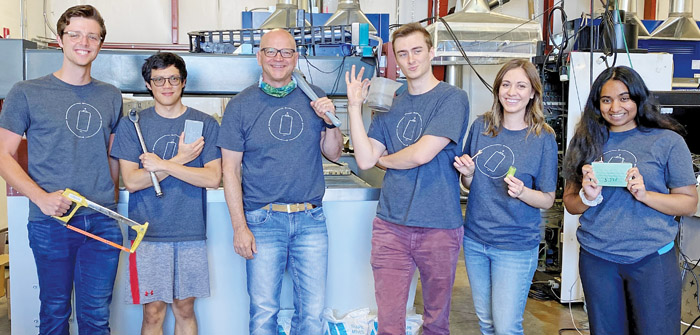(The OnTo Technology staff | Photo courtesy of OnTo Technology)
Recycling batteries plays an important role in protecting the planet: Failure to dispose of them properly is harmful to the environment, and when a battery reaches the end of its life, it can become dangerous and even create a fire hazard.
While the use of rechargeable batteries is helpful to the environment, proper disposal of them is crucial. Enter OnTo Technology, a Bend company that addresses the safety and material value recovery for lithium-ion battery recycling. “Modern batteries can carry a lot of energy, and at end-of-life, it is a safety liability,” says Steve Sloop, president of OnTo. “To address this, OnTo developed simple, chemically benign methods to deactivate batteries so that they can be stored and shipped without risk of fire. Modern batteries contain highly engineered materials, which OnTo has figured out how to recover, using ten times less effort than other bronze-age, brute-force methods to refine minimal metals,” he explains. “OnTo’s patented methods are being commercialized through efforts with strategic partnerships in the battery industry.”
OnTo was founded by Sloop in the early 2000’s to develop technologies aimed at the opportunities for lithium-ion battery recycling. “My understanding of these opportunities came from my experience at Lawrence Berkeley National Lab, working with a team to develop diagnostics for lithium-ion battery life-limitations,” says Sloop. “Bend is a great place to do technology development considering the network of schools, STEM businesses and experienced people in the region. The Bend and Central Oregon quality of life is a staying root for OnTo employees.”
In 2020, OnTo was a semifinalist in the Impact Competition at the Bend Venture Conference. “I have been in Bend for 20 years, but I was working for one of the spinoffs from Bend Research,” says Sloop, who grew up in Salem and received his bachelor’s degree in chemistry from Willamette University and his Ph.D. in inorganic chemistry from Oregon State University. “I’ve been an Oregonian for a long time, and wanted to stay in the area to work.” When doing his post-doctoral work at Lawrence Berkeley Lab in Berkeley, California, Sloop says he came up with the idea of working on direct recycling. “In the late 1990s, I felt recycling of batteries was a new field and a good place in which to go to work.”
He started out as a consultant 21 years ago, he says, and in the beginning, was primarily doing contract research and development. “We managed to keep going, addressing recycling in all the different chemistries out there.” Since that time, Sloop says his team learned that battery materials can be recovered in whole, and OnTo’s patent portfolio now includes whole battery deactivation, sorting, harvesting of electrode materials, cathode-healing and clean precursors for new cathodes. The business has grown, and in 2020, OnTo had its largest staff ever — with eight employees — even during COVID.
The services OnTo now provides include:
- Working with a manufacturing developer to evaluate, design and scale battery lifecycle services and products;
- Lithium-ion recycling evaluation;
- Safe deactivation of batteries;
- Cell materials recycling; and
- Specification development, battery prototyping and testing.
“We’ve been working away on these projects and getting lots of interest in our recycling technology,” says Sloop. “The electric vehicle market has started to really develop and grow; and the question for customers is what happens to the recycling of the product? EV batteries have two major problems: cost and lifetime. We are trying to get that lifecycle back.” He says the team is excited about recent developments and is looking at licensing technology with strategic partners. “We are interested in partnering with environmental industry companies.” He adds, “A recycling facility will last a long time, more than my lifetime. Once you put it in place, it’s there.”
In the near future, OnTo will commercialize its Safe Deactivation and Cathode-Healing technologies with strategic partners in the battery industry for both defense and civilian applications, Sloop says. “I think the demand poll from manufacturers to recycle is critical. Getting manufacturers to use recycled materials changes the dynamic from a technical push to a demand pull. I think we are making good progress on that.” He adds, “We are excited about where we are now and the prospects for the future. We are being proactive and putting infrastructure in place. We are fortunate to have some longevity with this.”





